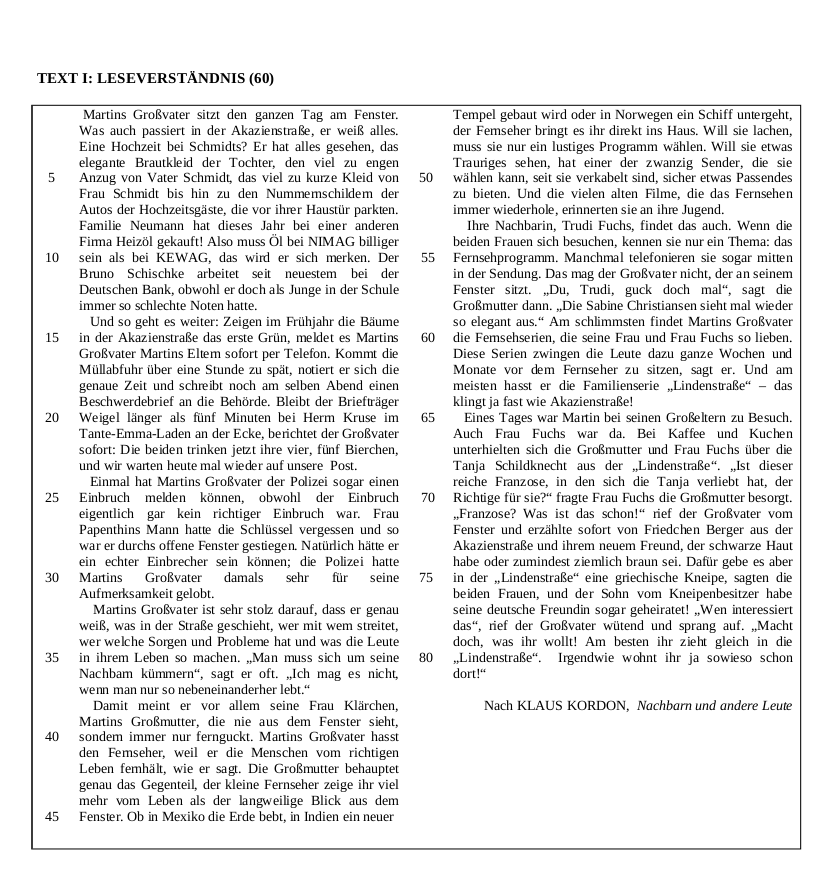

Answer Tips
(2 marks: 1 x 2 marks) Any 1 of the following:
1) Er will sehen/ wissen, was auf der Straße passiert// Er kann alles sehen/er sieht alles
2) Er will sehen, was die Nachbarn machen
3) Er ist neugierig
4) Er interessiert sich für das Leben auf der Straße

Answer Tips
(6 marks: 3 x 2 marks) Any 3 of the following:
1) Eine Hochzeit OR one relevant detail of Hochzeit:
• die Tochter trägt ein elegantes Brautkleid
• Herr Schmidt trägt einen viel zu engen Anzug
• Frau Schmidt trägt ein viel zu kurzes Kleid
• Autos parken vor der / ihrer Haustür
• Er sieht die Nummernschilder der Autos der Hochzeitsgäste
2) Eine Familie bekommt Heizöl // Heizöl wird geliefert/ gebracht
3) Bruno Schischke geht zur Deutschen Bank/ Arbeit
4) Die Bäume werden grün/ schlagen aus
5) Die Müllabfuhr kommt
6) Der Briefträger und Herr Kruse trinken Bier // Der Briefträger bleibt länger bei Herrn Kruse

Answer Tips
(6 marks: 3 x 2 marks) Any 3 of the following:
1) Der Fernseher bringt die Nachrichten(Or one manipulated example) / die Welt/ das Leben direkt ins Haus // Sie findet Fernsehen interessant
2.) Sie erfährt viel // sie lernt viel
3) Sie will lachen
4) Sie will etwas Trauriges sehen
5) Sie will alte Filme sehen // Sie will sich an ihre Jugend erinnern/ an ihre Jugend erinnert werden
6) Es gibt Programme für jede Gemütsstimmung/jede Laune // immer etwas passendes
7) Sie hat/ haben 20 Sender // sind verkabelt

Answer Tips
(4 marks: 2 x 2 marks) Any 2 of the following:
1) Übers Fernsehprogramm
2) Sabine Christiansen// wie elegant sie aussieht//Leute in der Sendung/Serie
3) Fernsehserien/ Lindenstraße

Answer Tips
(9 marks: 3 x 3 marks)
1) Trees budding (1): He rings Martin’s parents (to tell them) (2)
2) Refuse collection late (1): He writes down the exact time//he writes a letter(s) of complaint // he write to authorities (2)
3) Postman is late /delays (1): He says that they are having a few beers//he says they will have to wait for their post (2)

Answer Tips
(6 marks: 3 x 2 marks)
1) A man/Mrs Papenthin’s husband / a neighbour climbed in through a window
2) He had forgotten his key(s)
3) Martin’s grandfather thought he was a burglar/ breaking in // reported to police

Answer Tips
(9 marks: 3 x 3 marks) Any 3 of the following:
1) When she wants to laugh (1): she selects s funny/ humorous programme (2)
2) When she’s sad (1): she selects something suitable/ a sad programme/20 channels to choose from (2)
3) To reminisce/ remind herself of her youth/nostalgic (1) she watches old films (2)

Answer Tips
(6 marks: 3 x 2 marks) Any 3 of the following:
1) They are neighbours //live in the same street.
2) They watch/love TV // They watch soaps/ serials/ the same programmes/Lindenstraße// They could sit for hours and months watching TV.
3) They like to talk about the programmes/soaps/serials/Lindenstr.
4) Interest in Tanja Schildknecht/ the same characters.
5) They even ring each other during the programme.
6) They both like/have coffee and cake.

Answer Tips
(12 marks: 3 x 4 marks) Any 3 of the following:
Contrast
a) Grandfather always looking out window, grandmother never does.
b) Grandmother always watching TV, grandfather never does
c) Grandfather complains about grandmother but grandmother does not complain about him.
d) Contrasting attitudes to what life is (das Leben versus das richtige Leben)
e) Grandfather interested in local events, grandmother in world events// They observe day to day lives in different ways
f) Grandfather interested in real people / real lives / reality/Akazienstr./ grandmother interested in “soap” people/ “soap” lives /fiction/Lindenstr.
g) The Grandfather passes judgement on the neighbours, while she doesn’t.
h) Grandfather doesn’t seem to have friends, grandmother does
Compare
i) Both sit a lot
j) Both use the phone to communicate their reactions to events
k) Both look at life from a distance, from a window or on television
l) Both talk about/ react to what they see
m) Both are preoccupied with other people’s lives
n) Both are devoted to one thing// enjoy what they are doing (looking out window/TV)
o) Both believe their way is better than the other.
Language/Content
p) Use of opposites: immer (always) / nie (never) liebt(loves) / hasst(hates)
q) Das Gegenteil (Z.43)
r) Grandfather associated with negatives (hassen, wütend, am schlimmsten, complaining), the grandmother with positives (lachen, mehr vom Leben, lustig, elegant)
s) Grandmother says things in a normal tone of voice (meint, sagt, unterhielten sich), grandfather shouts (rief x 2)



